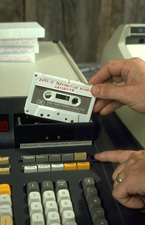Popular Music: Influential Events, Institutions, and People

Thomas Edison’s invention of the phonograph in 1877 manifested the music industry. His intention wasn't to design a device for recording music—he only meant to create a new way for business owners to dictate letters and record contracts. He actually resisted the use of his technology in music until competitors provided the idea that there was a large market for it. That industry was so large that it could not be ignored. The amount of space on a record also limited the length of the songs that were written. It assisted society in discovering how many different kinds of music there were.
This dramatically changed society’s understanding of music. It changed how society functioned quite substantially. People no longer gathered in others’ parlors to listen to each other play the piano. Piano sales fell. Instead people gathered around their Victrolas (phonographs).
Technology has continued to change, thus changing how music is created and how people listen to it and acquire it. It also changed the financial realities of recording and distributing music.
1900: phonographs
1920: electrical recording
1945: tape recording, long-playing record, FM radio
1960s: 8-track tape
1970s: cassette tape, VHS tape
1990s: compact disk (CD), Internet
2000s: MP3 players, digital downloads
Today musicians use their laptop computers and turn them into recording studios. Twenty years prior, that would have cost tens of thousands of dollars, whereas today it costs around $500. Musicians can distribute their music utilizing the Internet, which makes their music instantly available anywhere in the world.
The recording industry and, more importantly, the digital age has seriously impacted the livelihood of musicians. In the age of digital downloads, many people are taking liberties and downloading the music for free—paying the musician and songwriter nothing for their work. This has created an entirely different industry to protect the legal rights of musicians and songwriters over their own creations. You can learn more about this at The American Society of Composers Authors and Publishers.
